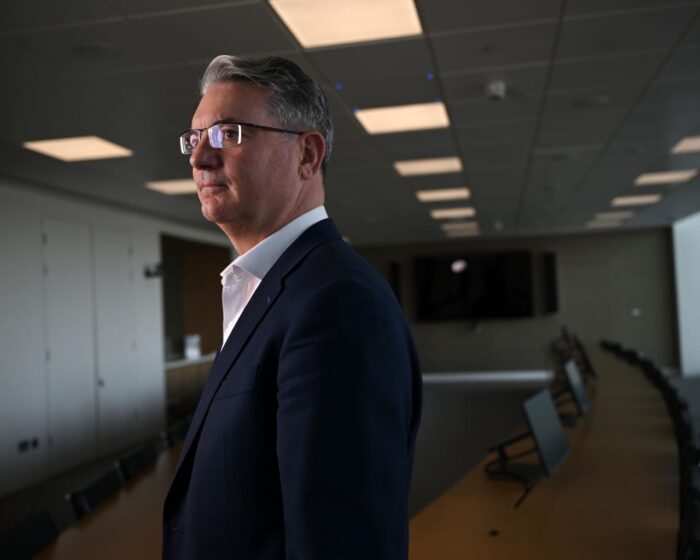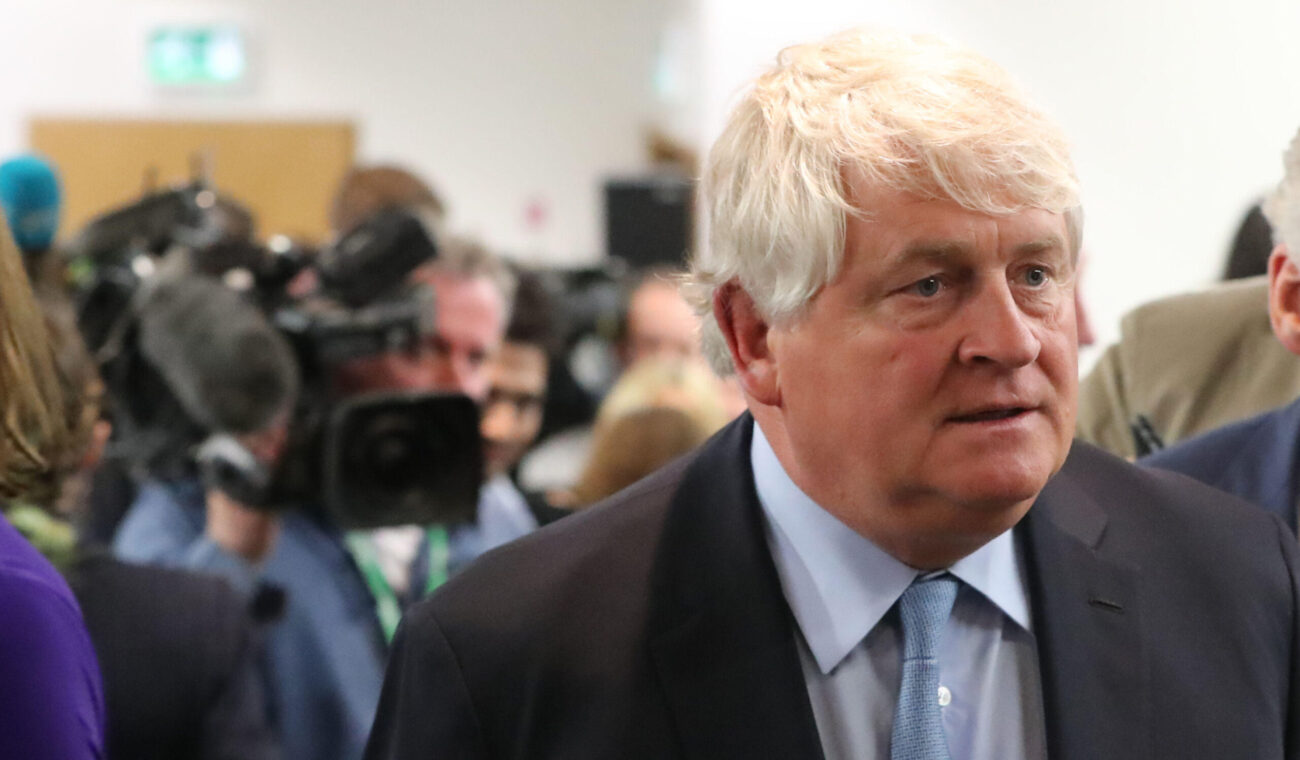Last weekend, as part of my column reexamining Michael Lowry’s criminal conviction for tax offences, I dwelled upon the luxury afforded to the influential politician and businessman Denis O’Brien concerning the findings of the Moriarty tribunal.
In essence, I explained that whenever anyone refers to the findings of the tribunal, it is always quickly caveated with the fact that both men reject the findings.
I even do it myself – not because there is an overt legal requirement to do it, but rather because both men are highly litigious and it is easier to add in the rejection and move on.
As I testified in a High Court defamation case initiated by O’Brien, a warning light goes off in a newsroom whenever his name is mentioned. Meanwhile, Lowry, as Sam Smyth outlined in his recent piece, is also prepared to launch litigation.
And, in addition to adding that caveat, one of the golden rules when reporting on the findings of the tribunal is not to draw conclusions from the report and instead rely on what was specifically stated.
That is what made two recent judgments by Ms Justice Emily Egan so interesting.
Both the judgments relate to a case taken against the state by Persona, the consortium that lost out to O’Brien in the battle for the state’s second mobile phone licence.
Persona, led by Tony Boyle and Michael McGinley, has claimed in court that the tender process was “corrupted” by the then communications minister Lowry, who they believe “abused his office”, “accepted payments and/or benefits” from O’Brien or Esat and secured the award of the licence to Esat (needless to say, O’Brien and Lowry reject these claims). O’Brien is also a defendant in the action, while Lowry is a notice party.
In a recent judgment relating to the discovery of documents for the case, Justice Egan stated: “The Tribunal has carried out its inquiry and has concluded that there was corruption at the highest level of Irish politics which impacted on the award of the GSM licence.”
The use of the word “corruption” was, well, interesting. While Persona has used the phrase in its legal filings, the tribunal report did not use the word in relation to the mobile phone licence.
The judge used the line when weighing up whether a duty of confidentiality was outweighed by the requirements of natural justice. In the judgment, she opted for the latter and instructed the discovery of 1,239 disputed documents.
The judgment was delivered on January 27, and I covered it extensively at the time.
Shortly after, however, Denis O’Brien made an application to the court, contending that Justice Egan had made a factual error in stating that the tribunal “concluded there was corruption at the highest level of Irish politics which impacted on the award of the GSM licence”.
O’Brien stated that it is a matter of fact “that no finding of corruption in relation to the GSM licence was made by the Tribunal in Volume II of its report”.
O’Brien requested that the “factual error” be remedied. In support of his application, he relied upon Order 28, rule 11 of the rules of the Superior Courts that state: “Clerical mistakes in judgments or orders, or errors arising therein from any accidental slip or omission, may at any time be corrected without an appeal…”
Persona, for its part, did not accept that the sentence was “factually erroneous or that it emerged through inadvertence or oversight”. Instead, the consortium argued that it was “a considered and accurate paraphrasing of findings made by the Tribunal”.
It pointed to the following extract of the tribunal’s report:
“[T]he Tribunal is satisfied that payments and other benefits, as set forth in Volume 1, were furnished by and on behalf of Mr Denis O’Brien to Mr Michael Lowry, and that these were demonstrably referable to the acts and conduct of Mr Lowry in regard to the GSM process, that inured to the benefit of Mr O’Brien’s winning consortium, Esat Digifone, as recounted in Volume 2, in each instance within the Tribunal’s Terms of Reference.”
Persona argued the court had, in essence, paraphrased the Tribunal’s conclusion, something it said the court was entitled to do.
O’Brien disputed this, stating that the sentence in question was “not expressed in terms which suggest that it is paraphrased”, so the suggestion that the court would be entitled to paraphrase did not arise.
Persona replied that O’Brien’s argument rested on “the false premise that a court drafting a legal judgment must either quote from another source verbatim or expressly indicate that it is paraphrasing another source — even where that may be manifest and obvious from the content and context, as they state is the case here”.
At any rate, in a follow-up judgment, Justice Egan accepted (“and indeed it is undisputed”, she stated) that the tribunal did not make a formal finding of corruption in relation to the award of the licence.
As such, she opted to make a correction, removing the sentence relating to “corruption at the highest level of Irish politics”.
This begged the question: What would replace the line?
O’Brien submitted that if the sentence was removed, it did “not need to be replaced by any other text since the import of the paragraph would remain and the paragraph would read coherently without it”.
The judge disagreed: “The point being made at para. 87 is that the Tribunal made findings which, if well founded, are of significant public interest. The principal judgment is careful to explain that those findings are not admissible. Nevertheless, the fact that the Tribunal had addressed matters of significant public interest is germane to the balancing test to be carried out in relation to discovery and production/inspection.”
So, Justice Egan opted to remove that one line, and replace it with a much deeper and wide-ranging explanation of the tribunal’s findings.
She wrote:
“The Tribunal has carried out its inquiry and, as summarised by McKechnie J. in Comcast International Holdings Incorporated v. Minister for Public Enterprise & Ors, it has concluded that “… Mr. Michael Lowry, TD (or “the Minister”), exerted “insidious and pervasive influence” on the evaluative process thereby undermining its integrity and independence. Improper payments and other benefits were found to have been furnished by or on behalf of Mr Denis O’Brien…to Mr. Michael Lowry, TD in relation to the conduct of the latter in securing the award of the GSM licence to Esat Digifone. Such conduct included: inappropriate interaction with Esat Digifone and Mr O’Brien, specifically during sensitive stages; acquiring inside information which in turn he disclosed to Mr O’Brien; making known his preference for awarding the licence to Esat Digifone, conveying his views on how to address Esat Digifone’s financial weakness by considering them curable by the granting of the licence; thereby rendering financial capability ultimately immaterial, contrary to Government policy; curtailing the work of the Project Group with decision-making power, by instead, centring such on a small subset of the group segregated from the expert consultants; and circumventing meaningful consideration by his Cabinet colleagues. This, it was found, resulted in the implementation of a process plagued with inadequacies and deficiencies, and in the creation instead of a distorted, renegade version of the originally planned evaluation process.”
It is quite the summary, and that summary will now sit in perpetuity in a High Court judgement, free to be used by any journalist, lawyer, or commentator to recite from with full protection.
Meanwhile, Persona’s legal action against the state goes on, and inches closer to a full hearing.
The government that Lowry helped form is defending the case, despite accepting the findings of the report that Lowry rejects. It is all very Kafka-esque but, in this instance, Ms Justice Emily Egan has laid out the findings in clear prose.
Elsewhere last week…

Thomas met Edmond Scanlon at Kerry Group’s global innovation centre in Naas, Co Kildare – the nerve centre of the group where patents are registered and customers come from all over the world to work on their applications to their business. Over a lengthy interview, Scanlon took Thomas Hubert through a deep dive into Kerry’s tech-driven promise for continued growth. It is a fascinating interview about a fascinating company.
Feeling undervalued by investors and requiring more capital to fuel its ambitious growth plan, Ireland’s largest hotel group Dalata has triggered a strategic review that is expected to lead to a sale. It is the latest twist in a company formed from the embers of Ireland’s financial collapse. I examined the rationale for the company’s decision.
Born from the ashes of Sean Quinn’s business empire, the family’s online gambling business QuinnBet has proved a winner. But a fight is brewing with the group’s trustee over multi-million euro dividends and the rights of the next generation. Francesca had the story.
Mark Curtis, the head of innovation at Accenture Song, spoke to Michael about the fundamental shifts taking place in society and the growing desire to have real-life experiences away from smartphone screens.


